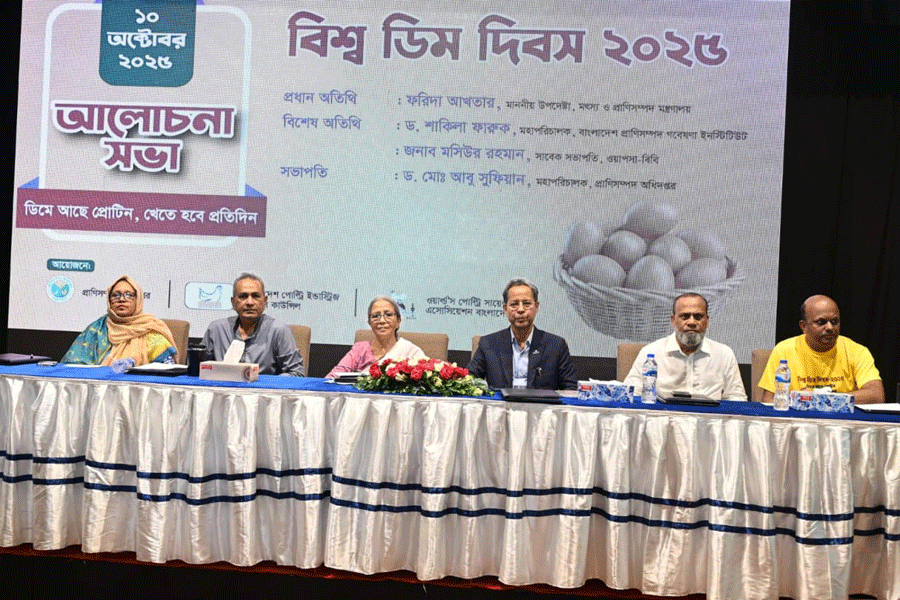World Egg Day 2025 observed
Eggs should be added to school feeding programme, says Adviser Farida

Published :
Updated :

Farida Akhter, adviser to the Ministry of Fisheries and Livestock, on Friday said that eggs should be included in school feeding programmes.
She mentioned that students are currently being given milk, and eggs should also be added to that menu.
She made the comment at a discussion meeting held at the Krishibid Institute in the city, organised by the Department of Livestock Services with support from the Bangladesh Poultry Industries Central Council and the World Poultry Science Association, Bangladesh Branch, marking World Egg Day 2025. This year’s theme is “Eggs contain protein -- eat them every day.”
Speaking as the chief guest, Farida Akhter said many poor children do not get enough nutrition. If eggs are added to school meals, that nutritional gap can be filled.
She said that everyone in the country is connected to eggs -- both in production and consumption. While not everyone can afford beef, eggs are easily affordable. Children should get proper nutrition by the age of six, so eggs must be included in school feeding programmes.
She also noted that 80 per cent of eggs come from small farmers, many of whom are poor rural women who raise a few chickens to support family nutrition.
Farida Akhter expressed concern that pesticide use in agriculture is threatening poultry farming. She also said that duck eggs from the Haor (wetland) areas are not being promoted enough, and more publicity is needed for them.
Regarding soybeans, she said that imported soybeans are genetically modified (GMO) and could affect health. Therefore, Bangladesh should focus more on corn production instead and ensure that eggs are safe to eat.
Dr Md Abu Sufian mentioned that during the COVID-19 period, 180,000 small farmers received direct incentives, and support for their production is still ongoing.
Dr Shakila Faruq said that people should consume protein based on their weight and age. She added that farm eggs are larger and have more nutrients than local eggs, but there is no protein difference between white, brown, duck, or quail eggs. However, local eggs taste better.
Professor Dr Mahmudul Hasan Sikder said that 60–70 per cent of egg production costs come from feed, and since there is no national production target for eggs, a roadmap for the poultry industry is needed.
Dr ABM Khalekuzzaman said that the price of one-day-old chicks fluctuates a lot, so the cost was fixed last year at Tk 53 (including other expenses) to keep the market stable.
Mosiur Rahman said that 80 per cent of eggs are produced by small farmers, and they need more support. Currently, training for 600 farmers has been arranged in four divisions, and another 600 farmers will be trained soon in two more divisions.
He also mentioned that, to deliver eggs directly to consumers, middlemen should be reduced and those who hoard eggs should be punished. In the past, during the previous government, there were even intelligence offices set up inside farms, which made production difficult.
The meeting was chaired by Dr Md Abu Sufian, Director General of the Department of Livestock Services. Other guests included Dr Shakila Faruq, Director General of the Bangladesh Livestock Research Institute, and Mosiur Rahman, former president of WPSA-BB. Professors Ilyas Hossain and Dr Mahmudul Hasan Sikder from Bangladesh Agricultural University presented a paper.


 For all latest news, follow The Financial Express Google News channel.
For all latest news, follow The Financial Express Google News channel.